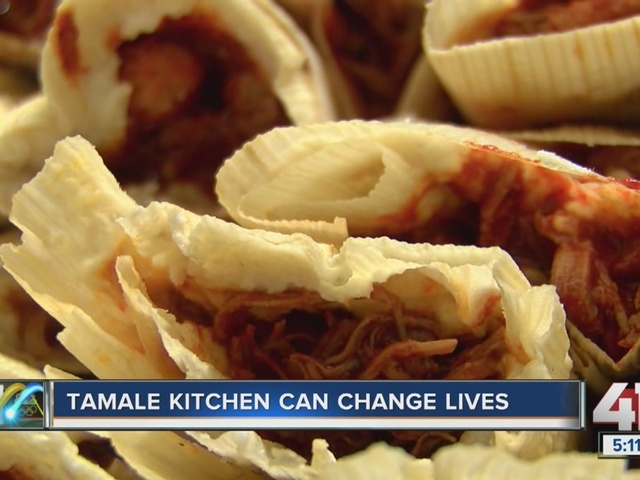Every Tuesday six ladies gather in a kitchen on Seventh and Paseo. They put on hairnets, gloves and aprons. They unload pounds of groceries, and all take their positions.
“It’s a ritual, as they say,” one woman named Velia said.
Making tamales is a tradition going back thousands of years. It’s usually done in your grandma’s hot, cramped kitchen over the holidays.
Velia, GiGi, Maria, San Juana and Cece have turned an inherent part of their Mexican culture into a profit.
“The Tamale Kitchen is so much more than tamales,” founder of The Tamale Kitchen, Becky Gripp, said.
Gripp found the ladies through Our Lady of Peace Catholic Church, a poor parish in Northeast Kansas City, Missouri. The pastor told Gripp they were frustrated with not being able to find enough work to make a living. The idea came to her.
“We knew that if we found this path, and tamales happen to be the pathway, we would be able to impact the families, the church, and the local businesses in the community,” Gripp said. “It’s kitchen table economics.”
The Tamale Kitchen is a not-for-profit social enterprise. The ladies take home all the profits from their efforts.
The ritual
The group makes hundreds of tamales at a time for catered events and farmers markets. It’s a 8-hour process.
First they shop at Gringo Loco, a grocery store down the street, stocking up on pork, chicken, chilies, corn husks, spices, manteca (lard) and corn flour. They prepare the meat and mix the lard and flour into a dough called "masa."
“Some prepare the chile, and others prepare the meat, and between us all, we fill the corn husks,” Velia said.
Tamale-making is traditionally a hierarchy. Velia takes charge of the meat, the highest position on the totem pole.
The masa is spread with a spoon on the inside of moist corn husks. Then shredded pork and chicken, drenched in a secret red or tomatillo sauce, is rolled up inside to steam.
Their quick assembly line style makes it look easy.
Cultural pride
Gigi said they’ve been making tamales since they were little, and are now teaching the younger generations. They never thought something so natural could better their lives.
“It helps us economically, and we like doing it,” Gigi said. “It’s an opportunity to learn how to run a business, how to get ahead.”
Because of Gripp’s ties in the community and the undeniable deliciousness of their product, The Tamale Kitchen has a lot of support. The orders keep rolling in.
“If you put in the ingredient of love, the recipe will come out,” Velia said. “Everything is made with love, and if it’s not, it won’t come out right.”
There’s no written recipe.
“Generations and generations. I think from my great-grandmothers, I don’t know. Probably older than that,” Velia said.
It’s engrained into each one of them.
“It’s my culture,” Gigi said.
It's usually done with family, but their kitchen is open to all.
“We invite the community, both Latino and American, to try our tamales,” Velia said. “They’re very tasty.”
Community integration
Gripp said they’ll have to hire more ladies to keep up with demand. The quintet said they’re blessed.
“We know that when you put money in the hands of women, they think about it and spend it differently,” Gripp said. “We have family, faith, and culture.”
The Tamale Kitchen operates for free out of the Kansas City Community Kitchen.
Check out The Tamale Kitchen's website to learn more and order tamales.
The organization has community partnerships with the Hispanic Chamber of Commerce, Northeast Chamber of Commerce, Blue Valley CAPS, Aerial Marketing, UMB Bank, Holy Rosary Credit Union, Bright Futures Program and Our Lady of Peace Catholic Church.
-------
Sarah Plake can be reached at Sarah.Plake@KSHB.com




